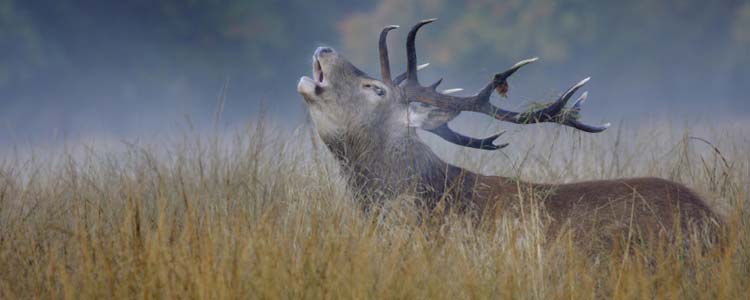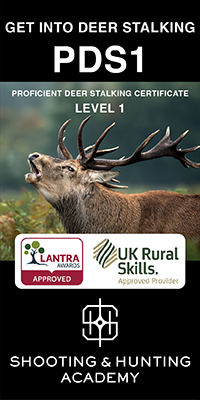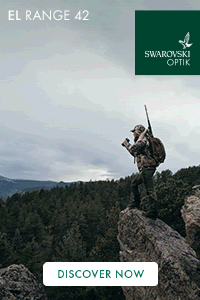James Schneider looks at the motivations behind urban deer control and how even the most avid animal lover can turn in the event of a decimated Rose bush.
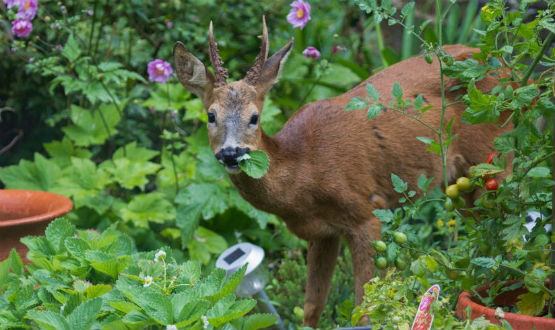
(Above: Roe deer are a common and unwelcome sight in many gardens across the UK)
I recently had the opportunity to take on a small piece of land to support a conservation effort being managed in a closely populated area. There were thousands of tree plantings critical to restoring a large meadow that were being chewed bare by a resident roe population. I was put in touch with Mrs. McDermott, the land owner via a mutual friend and was advised the deer were “everywhere, prolific, like a plague!”
The challenges involved in taking on a situation like this are many, and I arranged a time to meet together with Peter Jones to assess the ground, understand the plight of her conservation project and secure the lease.
Mrs. McDermott, a pleasant Scottish grandmother to the manor born, was the definition of charm as she invited us in for tea. She was very concerned that we understood she had no blood-lust, and questioned if shooting the animals was the right thing to do. She had considered this only after exhausting various avenues of research for resolving the problem to include darting, wildlife sterilization, even contacting local animal-control agencies who were unable to assist; all the usual alternatives that once researched in any detail are quickly proven to be expensive, unrealistic and ineffective management control methods for urban deer.
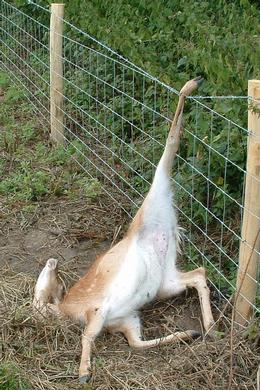
(Left: Whilst deer fencing is an option for many gardeners, it can be expensive and unless instaled properly, and to the right height, it can have tragic consequences)
It was when I casually asked about her views towards the group of roe that were damaging her extensive rose garden that bordered the croquet lawn in front of the great house, that I saw the sunshine leave her aura and her eyes grow very firm. Her lips pursed and upon exhaling, she gave her command in a crisp Highland accent:
“Shoot them. Shoot every one of them.”
Apparently I had hit on a sensitive subject. Nibbling the seedlings in the meadow was bad, and managing the roe was a necessary decision as part of the recovery struggle. However, when the roe hit the Lady of the Manor’s rose bushes it was a game changer – look out!!!
Understanding this to be the key area of sensitivity, I concentrated efforts on the group wreaking havoc in the front garden. I was able to remove the offenders with clean neck shots at close range and in constrained proximity to the neighbors. The deer were exactly within the safe area with perfect back stop as identified during my risk assessment, and down they went like an over-served guest after winning on the Queen’s horse at Goodwood.
Having witnessed the cull from her third floor boudoir window, the next day I received a very satisfying email that read “James, my heart missed a beat yesterday. Please continue.”
Mrs. McDermott’s reaction is not unusual in the on-going battle between well-intended efforts to support environmental conservation while also effectively managing ones’ gardens/plantings, etc. To the human it is about maintaining balance, restoration and nurturing an idyllic setting with all its beauty. In contrast, the resident wildlife view these efforts as a free cervus burrito buffet with all you can eat nachos.
Without control, this unique urban challenge will only continue to grow, especially as the UK deer population approaches estimates of two million. To do so will take time and effort, and the lack of full time “professional” deer stalkers to help with urban control demonstrates the importance for recreational stalkers to achieve the highest level of training possible. Achieving DSC1 Trained Hunter status, and ideally DSC2 reinforced by on-going field experience is critical.
We in the stalking community rightly deserve to be seen as essential to maintaining the health of our natural environment. I am winning this battle one convert at a time, and we all should keep this in mind as our services become more relevant to conservation efforts.
A decimated rose garden, vehicle-deer collision or the sight of a malnourished animal due to overpopulation highlight the critical role Trained Hunters play in the UK’s environmental management requirements. In Mrs. McDermott’s case, her belief in the “Anti” narrative she’d been fed for decades changed radically when the damage hit home. In contrast, my efforts on her ground are now seen as an essential part of the overall conservation strategy to achieve the natural balance required for it to work.
It is a pleasure to positively impact the impression of an individual who may otherwise be indifferent or resistant to stalking though effective, efficient, discrete and courteous service. I hope others who share my commitment and enthusiasm will have the same opportunity to raise our profile in the mind of the public.
And finally, did I mention how much she now loves venison pie…!!!
 James Schneider is a DSC2 Trained and highly accomplished stalker and regular author at County Deer Stalking. To read more from James follow this link: young-blood
James Schneider is a DSC2 Trained and highly accomplished stalker and regular author at County Deer Stalking. To read more from James follow this link: young-blood
Alternatively to read more about other consequences of high deer numbers in built up areas follow this link: confessions-of-a-deer-warden




